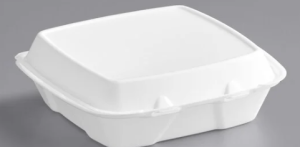What can we do about the relentless and concerning increase in the production of plastics and plastic waste? According to a report from statista.com, in just the last two decades, global plastic production has doubled to a staggering 400.3 million metric tons in 2022. Since less than 10% of plastics are recycled, the majority ends up in landfills, incinerators or the environment.
In a decisive vote of approval for Green Needham’s Citizens’ Petition, Town Meeting adopted the ban on polystyrene (Styrofoam) containers, plastic stirrers and plastic splash guards. In addition, plastic straws may be given to consumers only upon request. Restaurants and food establishments will no longer be able to automatically include straws in beverages or with take-out orders. These bans will take place starting January 1, 2025, and will go a long way to decreasing single-use plastic waste in Needham.
Why these items
The Plastics Reduction Team has decided to focus on these items because of their impact on human health and the environment. For the most part, these items are also either unnecessary or easily replaced with less harmful products.
 Polystyrene, commonly known by its brand name Styrofoam, is a nonbiodegradable material made from the chemical styrene. Styrene has the potential to leach into food and drinks served in Styrofoam containers. The International Agency for Research on Cancer (IARC), the specialized cancer agency of the World Health Organization, has classified styrene as a probable carcinogen to humans. Long-term exposure to styrene has also been found to cause liver, gastrointestinal, and central nervous system effects. Restaurants that use Styrofoam containers can switch to reusable, compostable, or recyclable containers instead.
Polystyrene, commonly known by its brand name Styrofoam, is a nonbiodegradable material made from the chemical styrene. Styrene has the potential to leach into food and drinks served in Styrofoam containers. The International Agency for Research on Cancer (IARC), the specialized cancer agency of the World Health Organization, has classified styrene as a probable carcinogen to humans. Long-term exposure to styrene has also been found to cause liver, gastrointestinal, and central nervous system effects. Restaurants that use Styrofoam containers can switch to reusable, compostable, or recyclable containers instead.
Plastic straws, stirrers and splash guards contribute to litter, clog street drainage, and can end up in water systems where they degrade into harmful microplastics. Plastic straws and stirrers are consistently among the top 10 items found during the Ocean Conservancy’s International Coastal Cleanup each year. The proposed ban will encourage consumers to think about whether they really need a straw, and would prohibit food establishments from automatically including one in beverage containers and take-out bags. Patrons who do need a plastic straw will be able to get one upon request. For plastic stirrers, wooden versions are a simple and more environmentally friendly option.

